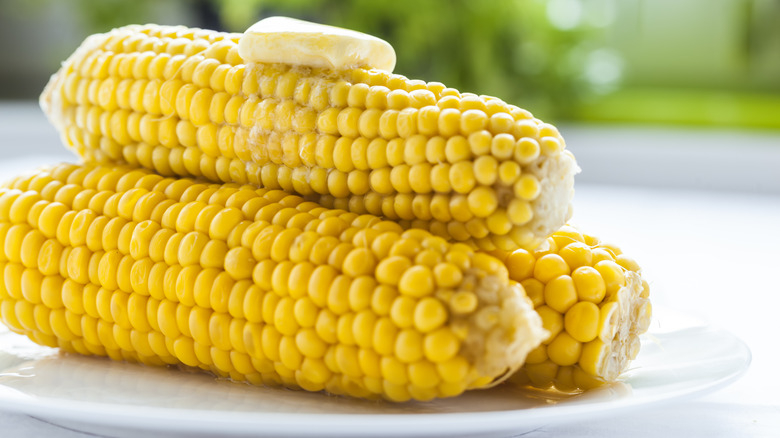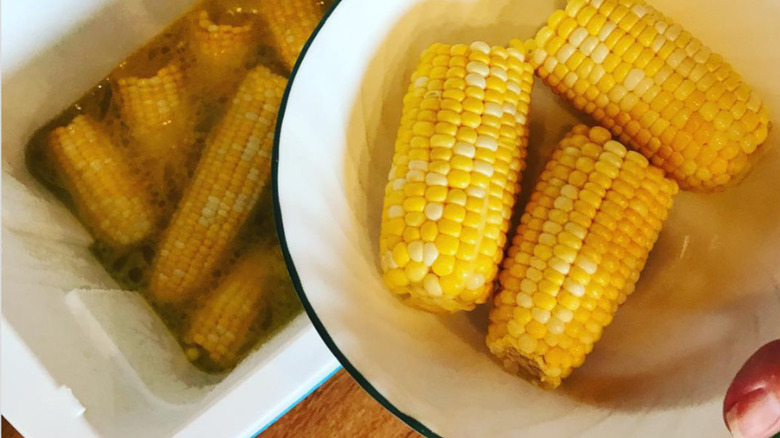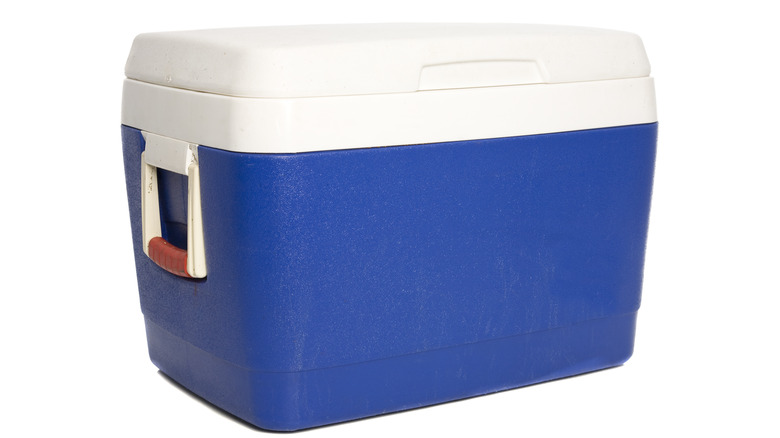The Drink Cooler Hack For Cooking Large Batches Of Corn At Once
Some cooking hacks can be a bit obvious or overblown but this trick is seriously cool: For your next backyard barbecue, try cooking a large batch of corn on the cob in your cooler. It may seem strange to cook food in something that's made to keep your drinks cold, but it's an easy and efficient way to cook this crowd-favorite side for a large group. Making cooler corn is simple: Place shucked corn cobs in a large cooler and pour in enough boiling water to completely cover the cobs. You can also add a couple of sticks of butter and salt to make it extra tasty and save your guests a step. Then, close the lid and let it sit for 30 to 45 minutes or until the corn is cooked.
There are just a couple of things to remember when making cooler corn. For one, make sure to save some space between the top layer of corn and the top of the cooler to prevent the water from overflowing. Also, you can always use a few smaller pots or kettles that are easy to carry instead of transporting one large pot of boiling water from your kitchen to the backyard. One of the best things about cooler corn is that your guests can easily serve themselves right from the cooler, just make sure they use tongs and are aware that it will be hot. You might also try breaking the cobs in half for easy-to-eat pieces.
It may be cool, but is it safe?
If you're wondering how safe eating corn from a cooler is, some experts say that when done right it does not pose a safety risk. On the podcast Risky or Not? food specialists Dr. Ben Chapman from North Carolina Cooperative Extension and Dr. Don Schaffner from Rutgers in New Jersey agree that it's not risky to eat cooler corn, largely because corn can be eaten raw, so even if it's undercooked it isn't going to harm you — it just won't taste the best.
However, they do advise vigorously cleaning the cooler before cooking and not eating any corn sitting in the cooler for longer than a couple of hours. You can sanitize your cooler with a mixture of vinegar and water and rinse well with hot soapy water to prevent any vinegar taste on your corn. Refrain from using bleach to sanitize your cooler right before cooking your corn to prevent contaminating your food with chemicals. Some of the advantages of cooler corn include being able to cook a large quantity for a big group and keeping it hot while freeing up valuable stove space. Also, while it's possible to cook in the cooler indoors, cooking the corn outside will make cleanup easier since you can just pull the plug and let the water drain, saving you from having to carry a heavy cooler full of water outside.
Cooler corn controversy
Despite some experts agreeing that cooler corn is safe to consume, there are some considerations to keep in mind. Many coolers, like Coleman for example, don't contain BPA, so you don't have to worry about this harmful chemical leaking into your corn. However, be aware that putting boiling water in some coolers might eventually warp the plastic and damage the insulation. According to Heve Malivert, the Director of Culinary Affairs at the Institute of Culinary Education (via Today), "Plastic coolers are not designed for such high temperatures — like boiling water — and will start to degrade over time. The plastic from the cooler is soft and can scratch easily, allowing foodborne pathogens to grow and boiling water may not kill all bacteria."
Malivert also said that eating the corn after it's been in the cooler for a couple of hours is not safe since "the water temperature will drop into the dangerous zone (between 41-135 F) and bacteria will start to multiply rapidly." This is true for any food left out of the refrigerator or not kept warm in a slow cooker. When two hours are reached, any uneaten food should be thrown out or stored properly, according to Ghaida Batarseh Havern, food safety educator at Michigan State University Extension (via Martha Stewart). So when cooking your cooler corn, remember to sanitize your cooler beforehand, don't leave it out for more than two hours, and limit how often you make cooler corn to prevent damage to the cooler.


